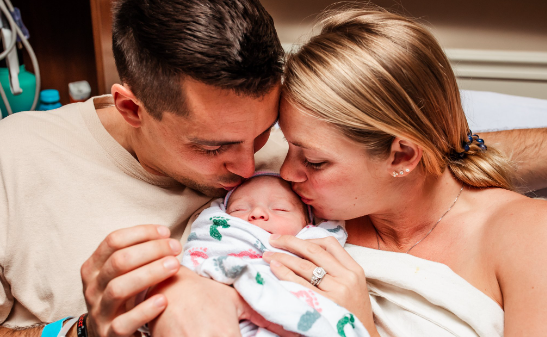NHS England is set to roll out a groundbreaking initiative to screen 100,000 newborns for more than 200 genetic conditions. This pioneering program aims to detect serious, rare genetic disorders early in a child’s life, enabling more timely treatments and better long-term outcomes. With the potential to transform neonatal care, the initiative is part of a broader effort to modernize health services and offer life-changing interventions to affected families through the NHS Program Screen 100000 Babies Over 200 Genetic Conditions.
All unseasoned parents are presently offered a blood spot test for their infants, typically when the youngster is five days old, to check whether they have any of nine uncommon yet difficult circumstances. The infant’s heel is pricked to gather a couple of drops of blood on a card that is sent away to be tried.
Presently, as a feature of an enormous scope research review, 100,000 babies will be offered a significantly more high-level trial of the entire genome sequencing utilizing blood tests commonly taken from the umbilical rope not long after birth. Anyways, Newborn children under 1 year old with as yet creating invulnerable frameworks are at the most serious gamble of difficult sickness, concerns rise as Whooping Cough Resurges.
“Diagnosing uncommon circumstances in infants at the earliest open door through genomic testing could be genuinely groundbreaking for families,” said Amanda Pritchard, the CEO of NHS Britain.
"It can possibly allow huge number of kids the opportunity to get to the ideal treatment with flawless timing, giving them the most ideal beginning to life, and for families to all the more likely arrangement for their consideration."The plan, which is being driven by Genomics Britain in organization with NHS Britain, will take a look at children for more than 200 uncommon circumstances. They incorporate metachromatic leukodystrophy (MLD), which causes an ever-evolving loss of physical and mental abilities.
Blood tests from in excess of 500 babies have previously been gathered at 13 NHS medical clinics, with plans to offer the test to 100,000 children across 40 emergency clinics in Britain. The NHS Program Screen 100000 Babies Over 200 Genetic Conditions will significantly enhance early diagnosis efforts.
By recognizing uncommon hereditary circumstances sooner, many youngsters could profit from prior finding and treatment that could end up being useful to slow movement of the sickness or expand their lives. Right now, a large number of these circumstances can be difficult to analyze, prompting postpones in care.

Pritchard said: “If we can analyze and treat youngsters for uncommon hereditary circumstances years sooner, we can assist with leaving crippling circumstances speechless and empower more kids to grow up, begin school, and live freely. This will be groundbreaking for patients and the fate of medication.”
Entire genome sequencing gives a readout of an individual’s whole hereditary code and checks for changes connected to explicit medical issues. The plan, which is known as the Age Study, will assess for over 200 conditions in children who seem sound yet whose side effects may not show until some other time throughout everyday life.
As a feature of enrollment to the review, pregnant ladies and their accomplices are being told about the examination during routine checks and welcome to partake in the NHS Program Screen 100000 Babies Over 200 Genetic Conditions.
If they decide to, an NHS specialist, medical caretaker, or birthing assistant affirms at the hour of birth they are glad to continue and afterward a blood test is gathered and shipped off to a research facility for sequencing.
One of the principal children tried for the various uncommon circumstances was Joshua Charnock – brought into the world at St Michael’s clinic in Bristol – after his folks, Gemma Charnock and Jimmy Cliftlands, joined the review.
Gemma Charnock, 39, who is hanging tight for the outcomes, said: “We felt the review could be useful to Joshua in the event that it tracked down anything and would empower him to seek treatment early – as well as ideally helping different kids. It was additionally painless so didn’t cause us any worries about the effect on him.”

Guardians are given the consequences of the test in the span of 28 days on the off chance that a condition is thought, or inside a couple of months assuming that no issues are gotten.
If an infant is distinguished as having a treatable youth condition, their families and carers will be offered further NHS testing to affirm the conclusion, in addition to proceeding with help and treatment.
Dr Rich Scott, the CEO of Genomics Britain, expressed: “Kids with these circumstances frequently go a very long time without getting a finding. Cutting this time would mean prior admittance to what can be groundbreaking treatment.”
He added that the exploration would assist with laying out whether genomic infant screening ought to be proposed to all youngsters in future.
Scientists are likewise trusting the review will assist them with more deeply studying the connection among qualities and wellbeing, which could prompt new medicines. Putting away hereditary data from birth may likewise assist with peopling who are determined to have diseases in later life.
NHS England’s new screening initiative, which will test 100,000 babies for over 200 genetic conditions, marks a major advance in early childhood healthcare. By identifying rare genetic disorders soon after birth, the program will offer families access to critical early interventions. This effort reflects NHS England’s commitment to using cutting-edge medical technology to improve outcomes for children and set a new standard for neonatal care through the NHS Program Screen 100000 Babies Over 200 Genetic Conditions.
Discover more from How To Got
Subscribe to get the latest posts sent to your email.

